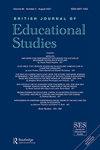Socio-Economic Inequality in Young People’s Financial Capabilities
IF 1.7
3区 教育学
Q2 EDUCATION & EDUCATIONAL RESEARCH
引用次数: 0
Abstract
Previous research has shown that the UK has low levels of financial literacy by international standards, particularly among those in lower socio-economic groups. This may, in turn, have an impact upon young people, with social inequalities in financial attitudes, behaviours and skills perpetuating across generations. Yet there has been relatively little empirical research on this topic to date, including how such inequalities may be linked to the parents’ actions and financial education provided by schools. This paper provides new evidence on this issue for the UK. Using parent-child linked survey data from 3,745 families, we find sizeable socioeconomic inequalities in young people’s financial capabilities, aspects of their mindset, and their financial behaviours. 15-year-olds from disadvantaged backgrounds having similar financial skills to an 11-year-old from an affluent background. Sizeable differences are also observed in the financial education that socio-economically advantaged and disadvantaged children receive at school, and how they interact with their parents about money. Parental interactions can account for part of the socio-economic gap in money confidence, money management, financial connections, and financial behaviours, but less so in boosting financial abilities. However, we find no evidence of differences in financial education in schools driving differences in young people’s financial capabilities.年轻人经济能力中的社会经济不平等
先前的研究表明,按照国际标准,英国的金融知识水平较低,尤其是社会经济地位较低的群体。这反过来可能会对年轻人产生影响,金融态度、行为和技能方面的社会不平等现象代代相传。然而,迄今为止,关于这一主题的实证研究相对较少,包括这种不平等如何与父母的行为和学校提供的金融教育联系在一起。这篇论文为英国提供了关于这一问题的新证据。使用来自3745个家庭的亲子相关调查数据,我们发现年轻人在经济能力、心态和经济行为方面存在相当大的社会经济不平等。来自弱势背景的15岁儿童与来自富裕背景的11岁儿童具有相似的财务技能。在社会经济优势和弱势儿童在学校接受的金融教育,以及他们如何与父母就金钱问题进行互动方面,也观察到了巨大的差异。父母的互动可以解释金钱信心、金钱管理、财务关系和财务行为方面的社会经济差距的一部分,但在提高财务能力方面则不然。然而,我们没有发现学校金融教育差异导致年轻人经济能力差异的证据。
本文章由计算机程序翻译,如有差异,请以英文原文为准。
求助全文
约1分钟内获得全文
求助全文
来源期刊

British Journal of Educational Studies
EDUCATION & EDUCATIONAL RESEARCH-
CiteScore
4.50
自引率
5.30%
发文量
36
期刊介绍:
The British Journal of Educational Studies is one of the UK foremost international education journals. It publishes scholarly, research-based articles on education which draw particularly upon historical, philosophical and sociological analysis and sources.
 求助内容:
求助内容: 应助结果提醒方式:
应助结果提醒方式:


